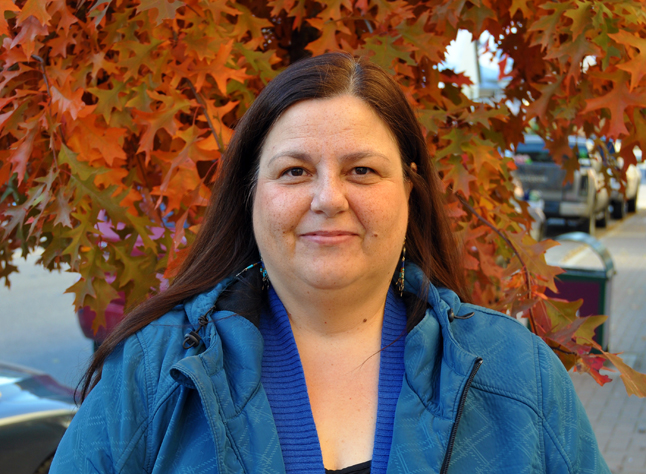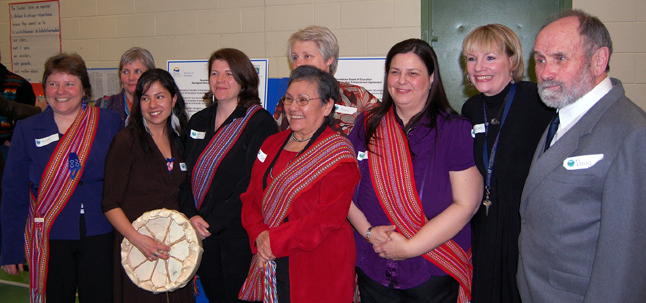
By David F. Rooney
When Lynne Barisoff walks out of RSS for the last time this month she’ll be leaving with 17 years of memories, some of them difficult, knowing that her years working to improve aboriginal education had truly made a difference.
“This is a big move for me,” she said in a recent interview at Conversations. “I’ve been here for 30 years — that’s a long time. All my kids were born here.”
But now, with son Jamie as the only child still at home, Lynne and her husband Rick have decided it’s time to pull up stakes and move to Chilliwack. Rick, who works for Ackland Granger, is already there. They still have to sell their house here but they’ll be close to their other children Erin, Wesley and Michelle and grandchildren.
She also has a new job — she starts November 12 — with the Ministry of Children and Families, supporting Aboriginal children in care, and working with parents and extended families to build relationships and strengthen family support systems. That’s not too dissimilar from what she was doing for some Revelstoke families.
Best known as SD 19’s Aboriginal Student Service supervisor, Lynne began working as a volunteer to improve the educational experience for Aboriginal children enrolled in its schools. She spent four years working towards the establishment of an Aboriginal education program and an Aboriginal Education Advisory Committee at a time when that kind of thing was a novelty. Not only was it regarded as a novelty, some people saw it as an unwelcome development.
Discrimination and prejudice against native peoples have been difficult cultural hallmarks in Canada as a whole and in the Western provinces in particular.
Discrimination existed within the student population and even among the paid teaching staff — a group you’d think was less likely to be infected by that cultural disease.
This was, as you might expect, extremely hurtful to a woman who was sensitive to her own roots and her own failings.
Lynne’s father was from Lac La Biche in northern Alberta; the stories she heard and her memories of life in that rural Cree outpost have stayed with her. Raised in Golden, she suffered through the kind of hell that is reserved for kids who are culturally, economically and racially different in Canada. She didn’t graduate from high school, met Rick, fell in love and had kids.
What she regarded as a personal inadequacy — that failure to graduate — aggravated Lynn and, encouraged by her father (who died seven years ago), she decided to do something about it.
“Dad valued education and always encouraged it,” she said. “All of my sisters had post-secondary educations and here I didn’t even graduate from high school.”
So she took correspondence courses and got her GED in 1990. On a roll, she continued her correspondence with Athabaska University and recently earned a BA in sociology. Now she’s completing an M.Ed in education.
“Education changes your life,” she said. “It makes you a perceptive person.”
For Lynne, it also ignited a passion for change so that her kids and those of other Métis and Aboriginal families wouldn’t have to feel like second- or third-class citizens in a country that doesn’t do a lot to encourage them to succeed.

Oh, Lynne is not a superwoman who worked alone to effect systemic change. She worked in concert with like-minded school board members, other teachers and staff, parents and Aboriginal leaders to work towards the creation of a government-inspired enhancement agreement. And, having achieved her GED she worked on her BA throughout the process that culminated in 2010 with the signing of an agreement to establish an aboriginal education component within the SD 19 curriculum. (Please click here to read about that achievement in a previously published Current story.)
These programs work to teach Métis and Aboriginal children about their culture. They help instill pride in their cultures and encourage them to succeed as students and as citizens. (Please click here to the aboriginal education page at the SD 19 website.)
School District 19 appreciates her work.
“Lynne began her paid work in the district in August of 1999, although we know that for the years leading up, her volunteer efforts to create the Aboriginal Education Advisory Committee were largely responsible for the outstanding programs and services that have continued for our students of Aboriginal ancestry since that time,” Mike Hooker, superintendent of SD 19, said of Lynne.
“Lynne has had a significant impact on the lives of hundreds of students over the past 14 years. She supported families, students, staff and the community to enhance education and to further our collective understanding of the important role Aboriginal peoples had, and have, on who we are today.”
Those are perceptive observations by Mike Hooker and, if anything, they confirm that Lynne’s impact on Revelstoke is greater than she knows.
She will be missed, too, by her friend and colleague, Lisa Moore.
“I first met Lynne about 20 years ago when we were part of a local Metis association,” Lisa told The Current. “Then, a couple of years ago she encouraged me to apply for the Aboriginal Education Assistant position for SD 19, where is my supervisor. Lynne has a great deal of knowledge regarding Aboriginal history and issues in Canada as well as the ability to make a person feel welcome and secure, which is why students come to rely upon her. She has been a great (and often called upon!) resource for myself as well. Lynne is a graceful and thoughtful person, full of compassion.
“Now. Lynne has a chance to be near the rest of her children and to be with her grandchildren, so although I will miss her, I am so happy for her!”
And what does Lynne think?
“I’m going to miss Revelstoke, especially all the small-town stuff,” she said. “But I’ll just keep on being who I am.”
Best of luck, Lynne. You have made a difference here. You really have.



